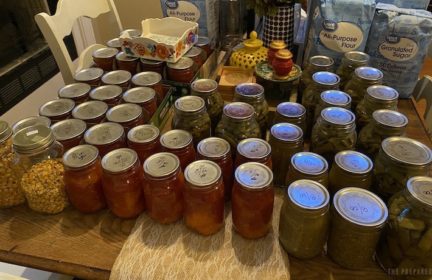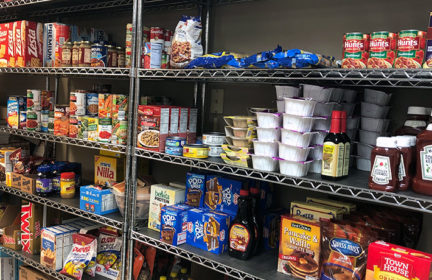Food prep inventory tracking
This is similar to brekke’s question about spreadsheets or lists. How do you all keep track of your food preps? Any great system or set up to recommend? I had a go at making a tracking system on google sheets but it seems unwieldy. I’d like to make sure I have enough, of things we eat, and that I rotate them well (the cooking and menu planning is a real strong point for me–the technology aspect not so much).
-
Comments (18)
-
Matt Black - June 23, 2020
Oh, sure… bait the nerd. I consider the trap sprung. LOL 😉
During the start of the pandemic, I realized it would be critical to keep track of supplies. I later found that, even though I’d come up with this really super cool spreadsheet for keeping track of inventory, I just wasn’t making the time to update it and so it fell into disuse.
What I’m doing now looks something like this:
I use masking tape and marker to date prepared food (leftover meals), fresh food, and food I’ve frozen. For packaged dried goods, I write the expiration date in an obvious place and, like you, I make sure to rotate stock. I haven’t stopped keeping track of what our stock levels are, but I’m not keeping exact counts. And, for me, that works out because our household is in a 2-3 week cycle of replenishing our top-offs.
Did I answer your question? I’m not sure I did. I hope I did. 🙂
-
MrsG - June 23, 2020
Ha, working on my trapper skills.
Right now I’m doing something very similar to your system–I write the exp. date in sharpie on the front of everything and then try to move things up from the back. I have been ordering some of my food from Azure Standard and just decided to test out the wonkiness of mylar bags and a 5 gallon bucket w/ gamma lid for some of my grains. I’m just having trouble getting a handle on how much we use when if that makes sense. I love the idea of a spreadsheet but my hunch is I’m not suddenly going to become a spreadsheet person.
-
Pops - September 6, 2021
Hi MrsG, I’ve been plugging Azure for a while on these type boards. I use them for bulk grains mostly, I have 100# of red wheat waiting on me to bag/bucket as I type.
-
-
SeaBee - June 23, 2020
inventory wolf is a good app that was developed by one of the members of this community. i’ve downloaded it and it seems pretty helpful. i should use it, but am currently too lazy
i’m with matt, and just label stuff and try to keep reasonable track of it. if i had a much larger store (years instead of just 3+ months), i might put more effort.
-
MrsG - June 23, 2020
Thanks for the app tip–I will check it out.
-
-
Rich DCContributor - June 25, 2020
At the risk of going off topic a little, I thought this might be relevant: Early on in this process I tried to read up on fresh foods that would last a long time. My approach has been more trial and error and less technological (though if a smart fridge could keep track of this for me, I’d jump at it). So, this is less inventory tracking and more, best practices?
- When reasonable/if you have space store things by age – Older items are always in front so I use them first. Older leftovers always go on top of newer ones so they get used first.
- Onions – keep them away from everything else, I’m told they may emit some chemical that can cause other foods to turn faster? This is second hand, but I’ve heard that fruits ripen at different paces depending on what they’re exposed to so it makes *some* sense?
- Potatoes – Its not enough to keep them someplace dark, someplace cool matters too (learned that the hardware when they kept sprouting in the dark, not realizing there was a heating duct beneath the cabinet they were kept in… now they live in cardboard boxes in the basement. I’ve never seen a sweet potato go bad in my life, but then they don’t usually last long enough for me to find out.
- Canned potatoes are apparently a thing and not always gross?
- Apples, lemons, and limes, and maybe other fruit – these apparently last a ridiculous amount of time in the fridge, if you have space. I’ve had apples go bad on the counter after a week or two, I’ve had apples look/feel/taste perfect after a month or more in the fridge. Same deal with lemons (great to pick up an otherwise bland meal).
- Broccoli and parsley – these can also last a decent amount of time in the fridge, if stored well, not packed in and stored dry, they probably won’t get slimy (I’ve seen it happen occasionally, but not too often).
- Hard cheeses don’t seem to go moldy as fast as softer ones. I’ve had blocks of Parmesan last for quite a while, cheddar tends to go faster. Buy blocks instead of preshredded and I’m told its safe to cut off mold if you do encounter it.
- I love heavy whipping cream, ultra pastured. It usually lasts longer than its expiration date, which is usually good for a month or two. Mix it with water to approximate half and half or even milk (works for some more forgiving types of baking even like biscuits).
- Leftovers – the key to avoiding food waste is to eat it. First in, first out style. Try not to cook more than you’re reasonably going to eat before it goes bad. In *real* survival scenarios where you think twice about throwing out questionable food, remember that boiling/high-heat kills a lot of bad stuff – so soup can *probably* be resurrected a day or two past its optimal use by (not a food scientist so don’t quote me though).
- Freeze strategically but creatively, and get quality ziplock bags and vacuum sealers. You can get creative, so if you do a pork shoulder in a slow cooker (add almost no water/extra liquid, you don’t need it) – save the juices and separate the fat that render out (makes great flavored rice, or a broth base for ramen, or replace butter/oil when cooking with pork fat). You can save it in a quart sized bag and make it fit whatever shape you need.
- You can save the remnants of broth/stock in bags or even freeze them in ice cube trays, hell I’ve done that with fresh lemon juice for cocktails (keep the end of the world classy, folks).
- Consider smaller packaging for meat and use smaller amounts to enhance otherwise blander staples (instead of burgers, do a home-made hamburger helper style pasta with Parmesan to stretch supplies and lean on shelf stable pasta – add frozen peas to get a veggie in there)
-
shtfhappens - July 12, 2020
Canned potatoes were some of the only things left in stock when I did a big supply run to Wally-World today.
Hadn’t heard that before about the onions. Interesting.
Do you think the effort to have “fresh” veggies (such as an apple in the fridge) is worth the extra hassle compared to having canned and/or freeze dried stuff?
-
M. E.Contributor - September 3, 2021
Canned potatoes are actually amazing. Dump them in a bowl in the microwave, heat them for ~2-3 minutes, drain WELL, plop them in a blender with LOTS of butter, and you have heavenly mashed potatoes. In an off-grid situation you could heat over a stove and mash up with a potato masher (and save the water for veggie soup).
-
John AdamaStaff - June 25, 2020
Have you checked out the new kit builder tool? https://preparedpro.xyz/kits/. We haven’t formally announced it yet, but a few people are already using it specifically to track food. We’ll be adding food-specific widgets to the kit builder soon, such as tracking calories and expirations.
-
TG - July 11, 2020
I stumbled across The Prepared a few days ago and the list maker in me geeked out over the kits feature. : )
-
John AdamaStaff - July 12, 2020
Awesome! We’re still working on that app and am hungry for feedback, so feel free to share! You can paste links to public kits here in the forum to share your work, too 🙂
-
-
Illini Warrior - September 3, 2021
https://modernsurvivalonline.com/survival-database-downloads/survival-tools/
take your pick >>>>>>>>>>>>
-
Barb LeeContributor - September 3, 2021
I don’t mind seeing a revival of this thread. I’m pretty proud of my Google Sheets inventory spreadsheet, especially since it’s the first spreadsheet I ever built or used. I created it about a year ago and I’ve never changed it.
My biggest problem has been making accurate entries. It’s so easy to grab an item and forget to note it, or to put something in, either without writing it down or entering some inaccurate information. I re-discovered the check-out chit. Now I have an additional “add” sheet and a “subtract” sheet that I make entries in manually, then update the spreadsheet when convenient. The check in/check-out lists have columns that prevent me from forgetting important information, like which storage box an item is located in, or the date I put it there. Since I created these sheets, my accuracy has gone way up. So learning to use the inventory has been a trial and error process.
It’s evolved further recently, when I realized how much unused stuff I had in stock, that was close to, or a little more than, a year old. It became clear that it doesn’t just matter, knowing when, where, and what is in stock. Of course I’m new at this level of seriousness about prepping. And I’m also the chief cook and bottle washer around here, so this stuff matters a lot to me.
We sat down and talked about the things we really like to eat on a daily basis (it’s all peasant food). So I wrote out a week’s plus worth of meals, and checked against my inventory to see if I could actually create those meals. Say, spaghetti. It doesn’t help to plan for a month’s worth of spaghetti dinners (once a week) if I have 10 pounds of pasta, three jars of sauce and no sausage or parmesan cheese.
So the food inventory is now gradually morphing into a meal-planning format, and once that happened, I realized I had to get my little self in gear and completely revise how I stock up.
An accurate paper copy of the inventory spreadsheet makes that a whole lot more practical.
There is a lot more to learn about the inventory, as I use it to actually pull ingredients from inventory and have everything I need to build those daily meals, and turn the stuff over all the time.
I found that none of the template inventory spreadsheets suited my situation.
A small business that I owned taught me the importance of having an accurate balance of raw materials on hand.
-
Bob - September 4, 2021
Good morning Dogpatch,
A good post for thread revival. Thank you.
My method is different. Our emergency inventory is distinct from everyday dining stuff.
We evolved to manual only. Electricity use already phased out.
The daily/routine stuff, like in refrigerator, used in usual way. I do keep 4 Aldi grocery store insulated bags on cabinet in case of electric failure (without me going into emergency mode-there is a cost to do this “mobilization”). Not appropriate to mention names as to why 4 Aldi insulated bags not always present. I have a hunch. Applicable current term is “person of interest”.
The trailer with emergency foods, mostly canned goods and cases of coffee. Must mention Folgers coffee is packed in a plastic type container’s that’s a prepper’s “love at first sight” – basic water proof, lid is easy to take off. Molded handle inserts built in.
Inventory governed by FIFO consumption pattern. Inventory is owned by our small co-op. Besides the items, costs get much attention. I’m in charge of co-op and we always have a strong cash position.
Appreciated reading you had a small business. The Defense Logistics Agency could use some small business owners to tell them about inventory control and industry best practices.
-
Liz Klein - September 4, 2021
I do something similar by saving my grocery receipts for the week, sometimes multiple weeks if I get lazy, and then when I balance my spreadsheets, I use them as a reminder of what I bought to mark that down.
-
Bob - September 4, 2021
Good afternoon Liz,
Good for you re the tally of costs.
My compliments.
Only a few in population watch costs. Most complain about their household finances.
-
-
Pops - September 6, 2021
I’ve been packing the shelves a long time. I don’t have a spreadsheet for regular pantry items per se, rather I just mark out shelf space for whatever item. If we eat green beans say, 2x a week normally, I set aside space in the kitchen pantry and the basement shelves for 100 cans of “green beans” of whatever variety. It is simple to tell at a glance that you need to buy a flat.
Ditto shorter term storage stuff like oils, flour, pasta (plain boxed kind). regular stuff that only stores a few years. I find that the hardest thing to store are oils and canned meat because we don’t use all that much. Oils in an emergency are very valuable, but they don’t last too long before going rancid. Ditto canned meat and fish.
have cracked and fed chickens or even planted wheat and corn beans I’ve stored after 20-25 years a couple of times now. We’re probably on our 3rd and final storing binge. I use the LDS recommendations for long term storage and an built a spreadsheet to plan my buying. I uploaded it here if you want to give it a try:
https://anonymshare.com/d/J0J/food:
(I don’t actually use Excell, I exported it from Mac “Numbers” so it shouldn’t have any marco viruses (if those are still a Windows thing))
The green cells are for you to fill out, the red cells are calculated. I used the LDS values for targets, adjusted slightly for our taste (more beans less rice) I didn’t zero out all the cells so you’ll need to adjust for your particular situation, but it will give you a start.
-
Alicia - September 9, 2021
I’ve started tracking the food in my various storage locations (outside the kitchen) in the same app I use for grocery shopping which is sharable with others: OurGroceries. I created a list for each storage zone and since the items are stored in a database, it only needs to be specifically added once then it’s an auto-complete set of keystrokes away from bringing it up again. The app will indicate if an item is on multiple lists. It has the advantage that I can check for the larder level while at the store seeing an item on sale. And it’s easy enough that my husband has embraced the process of noting when things are removed for use and occasionally ‘checking them in’ which entails adding it to the app, marking the expiration date on the front and putting it at the back in the larder location.
-
- News of the Week 2024-12-30 - 2 weeks ago
- (Official discussion) Rainy day funds and cash on hand - 4 weeks ago
- News for the Week 2024-11-18 - 4 weeks ago
- How to sew and repair a leather glove - 2 months ago
- Moooooooo…Can you rec a powdered milk? - 2 months ago
This forum is heavily moderated to keep things valuable to as many people as possible. Full community policies are here. The basics:
- 1. Be nice to each other.
- 2. Stay focused on prepping.
- 3. Avoid politics, religion, and other arguments.
- 4. No unfounded conspiracies, fake news, etc.
- 5. Debate ideas, not people.


